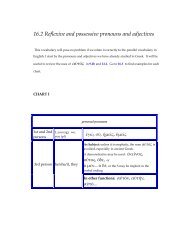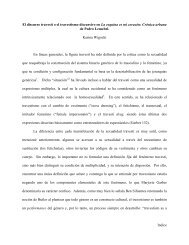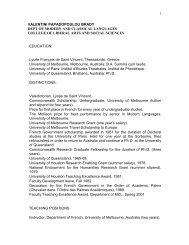Revenge, Justice, and the Law
Revenge, Justice, and the Law
Revenge, Justice, and the Law
You also want an ePaper? Increase the reach of your titles
YUMPU automatically turns print PDFs into web optimized ePapers that Google loves.
22 THE WAYNE LAW REVIEW [Vol. 50:4<br />
Is God acting immorally when he inflicts such suffering? I doubt that is <strong>the</strong><br />
lesson which <strong>the</strong> Bible seeks to teach. 79<br />
Indeed, <strong>the</strong> Bible does not reserve only unto God <strong>the</strong> right to revenge.<br />
Dinah’s bro<strong>the</strong>rs’ revenge for <strong>the</strong> rape of <strong>the</strong>ir sister, 80 is but one example<br />
of where <strong>the</strong> act, if not expressly countenanced by God, is nei<strong>the</strong>r <strong>the</strong><br />
subject of rebuke. Indeed, <strong>the</strong> Bible tells of God comm<strong>and</strong>ing <strong>the</strong> Hebrews<br />
to create three “cities of refuge” to which those accused of crimes could<br />
receive sanctuary from those seeking to avenge <strong>the</strong> alleged wrongful acts.<br />
If <strong>the</strong> accused was innocent of <strong>the</strong> crime, for example, if he killed ano<strong>the</strong>r<br />
person by accident, he could remain, unsca<strong>the</strong>d <strong>and</strong> protected in <strong>the</strong> cities. 81<br />
However, if <strong>the</strong> killing was without excuse, “<strong>the</strong>n <strong>the</strong> elders of his city shall<br />
send <strong>and</strong> fetch him <strong>the</strong>nce, <strong>and</strong> deliver him into <strong>the</strong> h<strong>and</strong>s of <strong>the</strong> avenger of<br />
blood, that he may die.” 82 Thus, while <strong>the</strong> ancient Hebrews recognized <strong>the</strong><br />
danger that a revenger who acted while his “heart [was] hot” 83 risked <strong>the</strong><br />
shedding of innocent blood, <strong>the</strong>y also recognized <strong>the</strong> legitimate right of <strong>the</strong><br />
avenger to exact <strong>the</strong> punishment once cooler heads had determined <strong>the</strong> guilt<br />
of <strong>the</strong> accused. 84<br />
In response, one might argue that even if <strong>the</strong> Bible permits suffering as<br />
part of punishment, requiring it as part of punishment is none<strong>the</strong>less<br />
79. Admittedly, all of <strong>the</strong> Biblical references cited so far in this Essay have come from<br />
<strong>the</strong> Old Testament. In contrast, <strong>the</strong> New Testament, particularly when retelling <strong>the</strong> story<br />
of Jesus, is often cited for its emphasis on mercy <strong>and</strong> forgiveness. For instance, Jesus’s<br />
admonition in John 8:7 to those who wished to stone to death a suspected adulteress that<br />
“He that is without sin among you, let him first cast a stone at her” is often cited as<br />
representative of <strong>the</strong> New Testament’s turning away from <strong>the</strong> often harsh justice of <strong>the</strong> Old<br />
Testament, towards a more forgiving social order. See JACOBY, supra note 11, at 89. While<br />
such an absolute differentiation between <strong>the</strong> two Testaments is probably overly simplistic,<br />
<strong>the</strong>re is some merit to <strong>the</strong> distinction. See generally JEFFRIE G. MURPHY, GETTING EVEN:<br />
FORGIVENESS AND ITS LIMITATIONS 87-93 (2003). Such an admission, however, does not<br />
invalidate <strong>the</strong> references to <strong>the</strong> Old Testament. Indeed, it is not <strong>the</strong> position of this Essay<br />
that vengeance should be <strong>the</strong> sole st<strong>and</strong>ard for determining justice. Ra<strong>the</strong>r, I would argue that<br />
just as <strong>the</strong> Bible, when read in its entirety, recognizes <strong>the</strong> virtues of vengeance <strong>and</strong><br />
compassion, so too, should <strong>the</strong> law recognize <strong>the</strong> value of both desires when deciding levels<br />
of fair <strong>and</strong> just punishment. See infra notes 202-04 <strong>and</strong> accompanying text.<br />
80. See supra notes 1-8 <strong>and</strong> accompanying text.<br />
81. Deuteronomy 19:2-6 (King James).<br />
82. Id. at 19:11-12.<br />
83. Id. at 19:6.<br />
84. But see infra notes 112-14 <strong>and</strong> accompanying text (discussing <strong>the</strong> New Testament’s<br />
prohibition against mortal’s exacting revenge in Romans 12:19).











